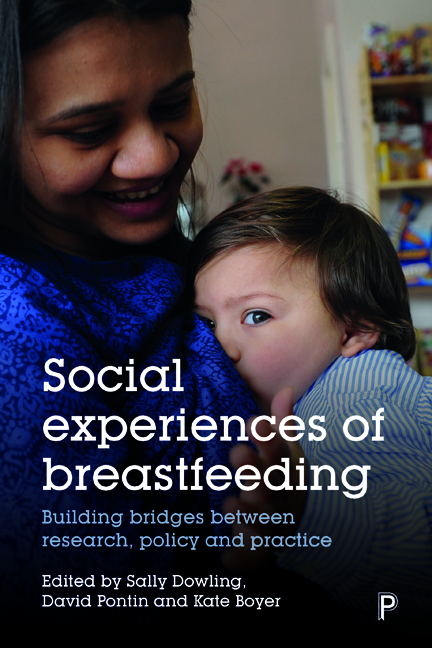Book contents
- Frontmatter
- Dedication
- Contents
- List of tables and figures
- Notes on contributors
- Acknowledgements
- Introduction
- The UK policy context: reconfiguration of the Unicef UK Baby Friendly Initiative to reflect the importance of relationships and ensuring sustainability
- Part I Breastfeeding and emotions
- Part II Cultures of breastfeeding
- Part III Breastfeeding and popular culture
- Conclusion
- Appendix: Schedule for ESRC Seminar Series: Social Experiences of Breastfeeding: Building bridges between research and policy, 2015–16
- Index
eight - Parenting ideologies, infant feeding and popular culture
Published online by Cambridge University Press: 22 April 2022
- Frontmatter
- Dedication
- Contents
- List of tables and figures
- Notes on contributors
- Acknowledgements
- Introduction
- The UK policy context: reconfiguration of the Unicef UK Baby Friendly Initiative to reflect the importance of relationships and ensuring sustainability
- Part I Breastfeeding and emotions
- Part II Cultures of breastfeeding
- Part III Breastfeeding and popular culture
- Conclusion
- Appendix: Schedule for ESRC Seminar Series: Social Experiences of Breastfeeding: Building bridges between research and policy, 2015–16
- Index
Summary
Introduction
Infant feeding is an emotive and politicised topic with various conflicting perspectives. This chapter takes a critical social and health psychological perspective to bring together different strands of the contemporary debate around infant feeding, drawing on ideas across the social and health sciences to explore key points of tension. These include media representation of infant feeding, health promotion discourse in a ‘neoliberal’ society, and the impact of contemporary parenting ideologies on parenting practices and parenting subjectivities. The aim is to reach a deeper understanding of the ways that competing discourses about what it means to be a ‘good parent’, and how we feed our infants, become operationalised in these different standpoints, using contemporary examples to illustrate these points of tension.
Infant feeding and the jigsaw of early parenting
To many ordinary people, infant feeding is commonly thought of as a simple choice for mothers to make between breastfeeding their babies or bottle feeding them with infant formula. However, very few people working in the field of infant feeding construct it in such simplistic terms; they recognise the discourses around infant feeding as being both complicated and nuanced. New parents have many decisions to make about the way they will care for their baby, and the way that their babies are fed forms part of the jigsaw of early parenting. One of the points of tension that comes into the infant feeding debates is the emphasis that is placed on how to feed babies, and whether it is regarded as just one of the many wide-ranging aspects people must face in the early period of parenting or whether it is the key topic of concern above all others.
With the complexities and competing tensions people face during early parenting, it often seems that if something has to give way to ease these tensions, then it is breastfeeding. Some argue that perhaps this has something to do with the wide and easy availability of infant formula. This decision may come about because there is both an alternative way of feeding babies, and because the manufacturing companies market infant formula as a trusted, safe and equal alternative to breast milk (Foss and Southwell, 2006; see Martin et al, 2016, for a recent nutritional comparative analysis of breast and formula milks).
- Type
- Chapter
- Information
- Social Experiences of BreastfeedingBuilding Bridges between Research, Policy and Practice, pp. 147 - 162Publisher: Bristol University PressPrint publication year: 2018

